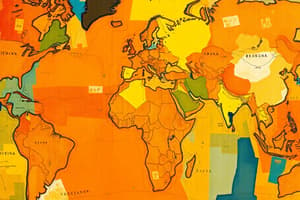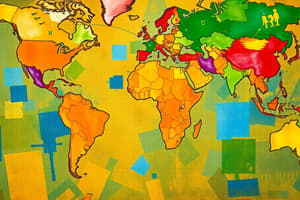Podcast
Questions and Answers
How did globalization contribute to growing poverty and unemployment in developing countries?
How did globalization contribute to growing poverty and unemployment in developing countries?
Globalization led to increased inequality and a growing informal sector without job protections, contributing to rising poverty and unemployment.
What contrasts can be observed between the economic development of East Asia and Latin America during the era of globalization?
What contrasts can be observed between the economic development of East Asia and Latin America during the era of globalization?
East Asia experienced significant growth and development, while Latin America saw stagnation, with growth in the 90s being only half of what it was in earlier decades.
In what ways has globalization exacerbated inequalities within advanced industrial economies?
In what ways has globalization exacerbated inequalities within advanced industrial economies?
Globalization has led to increased disparities in income and wealth distribution within advanced economies, affecting social stability and economic equity.
What role did unfair trade relationships play in the development of economic inequalities between core and poor countries?
What role did unfair trade relationships play in the development of economic inequalities between core and poor countries?
What factors contributed to the declines in per capita income and increases in poverty in Africa during globalization?
What factors contributed to the declines in per capita income and increases in poverty in Africa during globalization?
How did the control of trade tariffs benefit diverse cultures within the empire mentioned?
How did the control of trade tariffs benefit diverse cultures within the empire mentioned?
What role did Arab traders play in the development of trade networks during the expansion after 632 CE?
What role did Arab traders play in the development of trade networks during the expansion after 632 CE?
What impact did the Moors have on the trade networks in the Iberian Peninsula?
What impact did the Moors have on the trade networks in the Iberian Peninsula?
Describe the significance of Venice in the context of European global trade.
Describe the significance of Venice in the context of European global trade.
What kinds of goods were primarily exchanged through the trade networks established by Arab merchants?
What kinds of goods were primarily exchanged through the trade networks established by Arab merchants?
How did the expansion and rule of the Moors contribute to early globalization?
How did the expansion and rule of the Moors contribute to early globalization?
What types of infrastructure projects have Chinese companies invested in across Africa?
What types of infrastructure projects have Chinese companies invested in across Africa?
What natural resources have Chinese companies been involved in extracting in Africa?
What natural resources have Chinese companies been involved in extracting in Africa?
What sectors are Chinese companies primarily investing in Africa?
What sectors are Chinese companies primarily investing in Africa?
How does the trade between China and Africa typically flow?
How does the trade between China and Africa typically flow?
Besides traditional sectors, what fields are Indian companies involved in?
Besides traditional sectors, what fields are Indian companies involved in?
What role do technological advances play in globalization?
What role do technological advances play in globalization?
What political factors contributed to globalization?
What political factors contributed to globalization?
Which countries benefited the most from globalization?
Which countries benefited the most from globalization?
How has globalization impacted the historical economic standings of China and India?
How has globalization impacted the historical economic standings of China and India?
What was the impact of the Industrial Revolution on Indian textiles?
What was the impact of the Industrial Revolution on Indian textiles?
By what percentage did telecommunication costs decline in the 1990s?
By what percentage did telecommunication costs decline in the 1990s?
What is one positive impact of globalization?
What is one positive impact of globalization?
What are the key criticisms of how globalization has been managed according to the passage?
What are the key criticisms of how globalization has been managed according to the passage?
What does the passage suggest as a necessary condition for improving globalization for developing countries?
What does the passage suggest as a necessary condition for improving globalization for developing countries?
How has unilateralism affected global cooperation according to the passage?
How has unilateralism affected global cooperation according to the passage?
What indicates that change in globalization is unavoidable?
What indicates that change in globalization is unavoidable?
What potential crisis might arise if changes to globalization are not made proactively?
What potential crisis might arise if changes to globalization are not made proactively?
What factors hinder Africa's ability to compete in international trade?
What factors hinder Africa's ability to compete in international trade?
How did IMF/WB policies impact Latin America during the globalization process?
How did IMF/WB policies impact Latin America during the globalization process?
What differentiates the development experiences of China and Vietnam from those of transition countries following Washington consensus policies?
What differentiates the development experiences of China and Vietnam from those of transition countries following Washington consensus policies?
What is the primary cause of capital flight from poor countries to rich ones?
What is the primary cause of capital flight from poor countries to rich ones?
How does the international trade regime disadvantage developing countries?
How does the international trade regime disadvantage developing countries?
What are the consequences of agricultural subsidies in developed countries for the least developed countries?
What are the consequences of agricultural subsidies in developed countries for the least developed countries?
What calls have been made regarding intellectual property rights for developing countries?
What calls have been made regarding intellectual property rights for developing countries?
How does global warming exemplify social injustices between the North and South?
How does global warming exemplify social injustices between the North and South?
In what ways have traditional cultures been affected by globalization and WTO rules?
In what ways have traditional cultures been affected by globalization and WTO rules?
What is the risk of completing the Development Round negotiations without addressing the needs of developing countries?
What is the risk of completing the Development Round negotiations without addressing the needs of developing countries?
Flashcards are hidden until you start studying
Study Notes
The Rise of Globalization
- The text discusses the evolution of globalization, highlighting key historical events and factors that shaped its course. It emphasizes the role of trade networks, cultural exchange, and technological advancements in connecting the world.
- Early Global Trade: The empire controlled trade routes, influenced the flow of goods like spices.
- Cultural Fusion and Impact: Intertwined cultures, like Persian, Byzantine, and Arab, impacted developments in Europe and the Middle East. The conquest of parts of Europe by the Moors introduced new trade networks and facilitated the exchange of goods, cultures, and ideas.
- Chinese and Indian Trade: China's involvement in infrastructure projects and resource extraction in Africa has reshaped trade dynamics. The focus is on infrastructure development, resource extraction, and trade of manufactured goods and raw materials. Indian companies are also increasingly active in sectors like pharmaceuticals, technology, and consumer goods, adding to the complexity of trade interactions.
Causes of Globalization
- Increased Trade: The transfer of goods, services, aid, education, skills, and labor contributed to growing interconnectedness.
- Technological Advancements: Advancements in transportation (air travel, container shipping) and communication (internet, mobile phones) eased global connections.
- Economic policies: Trade liberalization, reduction of tariffs and barriers, fostered international trade and investment.
- Political Factors: The end of the Cold War and the spread of democracy promoted global cooperation and stability.
- Cultural Exchange: The global spread of media, entertainment, and cultural products increased awareness and acceptance of diverse cultures.
- Migration and Tourism: These activities facilitated global interactions and exchanges.
Successes of Globalization
- Newly industrialized countries benefited, with China and India experiencing rapid economic growth.
- The "East Asia Miracle" model, led by Japan, has been replicated by numerous nations, resulting in significant economic progress.
- Developing countries are closing the gap with advanced industrial countries, driven by high growth rates in China and India.
- Increased demand for commodities has benefited developing countries.
Historical Perspective
- China once held the largest share of global GDP, exceeding 30% in the 18th century. However, the Industrial Revolution and trade barriers hampered its economic growth.
- India’s share of global GDP exceeded 15% in the early 19th century, but it declined due to the impact of the Industrial Revolution and external problems.
- Globalization has been instrumental in the economic rise of China and India in recent decades.
Discontent with Globalization
- Uneven Development: Although globalization has contributed to economic growth, its benefits have been unevenly distributed.
- Latin America: Despite economic growth, Latin America still faces challenges in poverty reduction and socioeconomic development.
- Africa: Despite the end of colonialism, many African countries have struggled economically, confronting declining per capita income and widening inequalities.
- Inequalities: Globalization has exacerbated inequalities between countries and within individual nations.
The "World is not Flat"
- The text argues that globalization has led to increased inequality between nations, challenging standard economic predictions of convergence.
- Globalization has also contributed to growing inequality within countries.
Globalization’s Role in Inequality
- Unfair Trade: Unfair trade relationships between developed and developing countries, where poor countries lack the necessary industrial capacity and skills to compete effectively.
- Liberalization and Market-Led Economies: The transition to market economies in some developing countries has led to challenges like exploitation of resources, unemployment, and poverty.
- Finance: Instability in financial markets contributes to capital flight from developing countries to rich nations.
- Debt Burden: Many developing countries are burdened by high debt payments.
- Trade Imbalances: The international trade system is argued to be unfair to developing countries, with developed nations benefiting disproportionately from existing trade agreements.
Further Problems: Knowledge and Environmental Concerns
- Intellectual Property: The text highlights that the intellectual property regime can hinder developing countries from accessing knowledge and life-saving medicines.
- Global Warming: The disproportionate impact of global warming on developing countries is discussed, emphasizing that the North's pollution leads to consequences in the South.
Other Values Dominated by Economics
- Environmental Concerns: The text argues that environmental concerns are often sacrificed for short-term economic interests, with insufficient measures to compensate developing countries for environmental services.
- Traditional Culture: Globalization can erode traditional cultures, and the text highlights challenges faced by developing countries in protecting their cultural heritage.
- Democratic Processes: Undemocratic features of existing globalization are critiqued, highlighting the need for greater global democratic cooperation.
Nature of Opposition to Economic Globalization
- The opposition is not against globalization per se, but rather the way it has been managed.
- Concerns about market fundamentalism and the dominance of economic values over other principles are emphasized.
Needed Reforms for a More Equitable Globalization
- Trade: The text calls for a "true development round" of trade negotiations that benefit developing countries by opening up markets and providing opportunities for economic growth.
- Development Assistance: Developing countries require greater assistance from developed nations to address their economic challenges.
- Intellectual Property: The text calls for a "Development Oriented Intellectual Property Regime" to address the challenges faced by developing countries in accessing knowledge and medicines.
- Environmental Protection: Concerted efforts are needed to protect the environment in developing countries from the negative effects of globalization.
Conclusion: Making Globalization Fairer
- The text acknowledges that globalization is a complex and evolving phenomenon with both positive and negative impacts. It emphasizes the need for reforms to make globalization more equitable and sustainable, ensuring that its benefits are more widely shared.
Studying That Suits You
Use AI to generate personalized quizzes and flashcards to suit your learning preferences.




